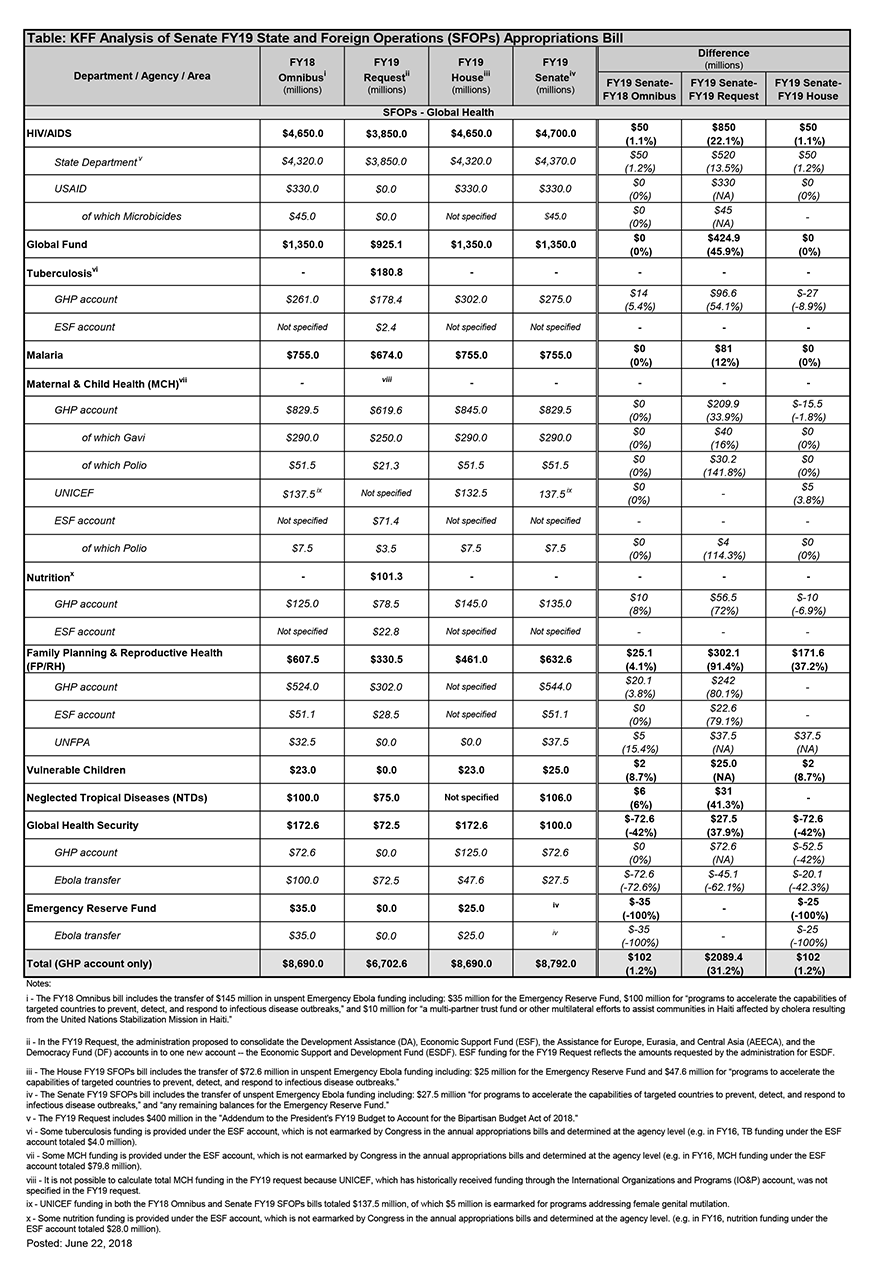Senate Appropriations Committee approves FY19 State & Foreign Operations (SFOPs) Appropriations Bill
- Funding provided to the State Department and USAID through the Global Health Programs (GHP) account, which represents the bulk of global health assistance, totals $8.9 billion in the bill, more than $100 million above the FY18 enacted and House FY19 levels, and $2.1 billion above the President’s FY19 request.
- Funding for all global health programs at State and USAID either increased or remained flat compared to the FY18 enacted level. Details are as follows (unless otherwise specified, totals represent funding through the Global Health Programs account):
- Bilateral HIV funding through the President’s Emergency Plan for AIDS Relief (PEPFAR) is $4,700 million in the Senate FY19 bill, $50 million above the FY18 enacted and House FY19 levels, and $850 million above the President’s FY19 request.
- The bill includes $1,350 million as the U.S. contribution to the Global Fund to Fight AIDS, Tuberculosis and Malaria (Global Fund), matching the FY18 enacted and House FY19 levels and $425 million above the President’s FY19 request.
- Funding for tuberculosis (TB) totals $275 million, $14 million above the FY18 level and $97 million above the FY19 request, but $27 million below the House FY19 level.
- Funding for malaria totals $755 million, matching the FY18 enacted and House FY19 levels and $81 million above the FY19 request.
- The bill provides $100 million in total funding for Global Health Security (GHS), of which $27.5 million is provided through a transfer of unspent emergency Ebola funding. The bill also transfers all remaining unspent emergency Ebola funding to the Emergency Reserve Fund, which Congress established in 2017 with the purpose of enabling the U.S. to respond rapidly to emerging health threats.
- The bill includes $830 million for maternal and child health (MCH), matching the FY18 level and $210 million above the FY19 Request, but $16 million below the House FY19 level.
- Gavi, the Vaccine Alliance, which is included under MCH funding, totals $290 million, matching the FY18 enacted and House FY19 levels and $40 million above the FY19 request.
- Polio funding, which is included under MCH funding, totals $59 million ($51.5 million through the GHP account and $7.5 million through the Economic Support Fund account), matching the FY18 enacted and House FY19 levels and $34 million above the FY19 request.
- The bill includes $137.5 million for the U.S. contribution to UNICEF provided through the International Organizations and Programs (IO&P) account, matching the FY18 enacted level and $5 above the House FY19 level. While the FY19 request did not specify a funding amount for UNICEF and proposed to eliminate the IO&P account, it is possible that organizations such as UNICEF could receive funding through other accounts.
- Family planning and reproductive health (FP/RH) funding totals $633 million in the bill, which is $25 million above the FY18 enacted level, $172 million above the House FY19 level, and $302 million above the FY19 Request.
- Bilateral FP/RH funding totals $595 million, which is $20 million above the FY18 enacted level, $134 million above the House FY19 level, and $265 million above the FY19 Request.
- United Nations Population Fund (UNFPA), which is included under FP/RH funding, totals $37.5 million, which is $5 million above the FY18 enacted level. Funding for UNFPA was eliminated in both the House FY19 bill and the FY19 request.
- Funding for nutrition totals $135 million in the bill, $10 million above the FY18 enacted level and $57 million above the FY19 request, but $10 million below the House FY19 level.
- Funding for neglected tropical diseases (NTDs) totals $106 million in the bill, $6 million above the FY18 enacted level and $31 million above the FY19 request. The House FY19 bill did not specify a funding level for NTDs.
- Funding for vulnerable children totals $25 million in the bill, $2 million above the FY18 enacted and FY19 House levels. Funding for vulnerable children was eliminated in the FY19 request.
- Reverses Mexico City Policy (also known as the “Global Gag Rule”) in law, as reinstated by President Trump via executive order on January 22, 2017 (see here for more information on the Mexico City Policy).
Resources:
- Senate FY19 State and Foreign Operations Appropriations Bill (see here)
- Senate FY19 State and Foreign Operations Appropriations Report (see here)
The table (.xls) below compares the FY19 House SFOPs appropriations bill to the FY18 funding amounts as outlined in the “Consolidated Appropriations Act, 2018” (P.L. 115-141; KFF summary here), the House FY19 SFOPs appropriations bill (KFF summary here) and the President’s FY19 request (KFF summary here).
Note: Some funding amounts (e.g. global health funding provided through the Economic Support Fund account at USAID) are determined at the agency level, and are not earmarked by Congress in the SFOPs appropriations bill.
The KFF Daily Global Health Policy Report summarized news and information on global health policy from hundreds of sources, from May 2009 through December 2020. All summaries are archived and available via search.
